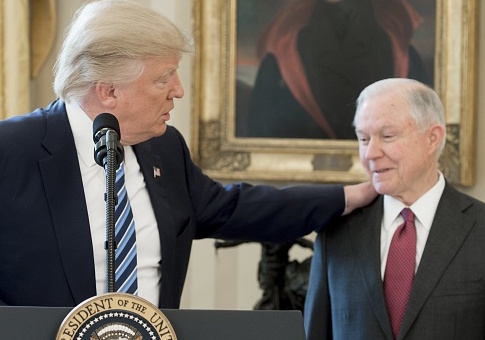President Donald Trump unsuccessfully sought to stop Attorney General Jeff Sessions from recusing himself from the Justice Department's investigation into whether the Trump campaign aided Russian meddling efforts in the 2016 presidential election, according to a new report.
Trump instructed White House counsel Donald McGahn II to beseech Sessions to stay in charge of the probe, saying that Sessions should protect him the way he believed past attorneys general had protected the president, the New York Times reported.
The revelation came from special counsel Robert Mueller's inquiry into whether Trump obstructed the FBI's Russia investigation.
McGahn told Sessions that Democrats would say he was a liar even if he recused himself—Sessions had been criticized for his prior interactions with Russia's ambassador to the U.S.—and that he did not need to do so until further into the investigation. But McGahn backed off after Sessions, who ultimately recused himself in March, said that career Justice Department officials advised him to step down, according to the Times.
Mr. McGahn was unsuccessful, and the president erupted in anger in front of numerous White House officials, saying he needed his attorney general to protect him. Mr. Trump said he had expected his top law enforcement official to safeguard him the way he believed Robert F. Kennedy, as attorney general, had done for his brother John F. Kennedy and Eric H. Holder Jr. had for Barack Obama.
Mr. Trump then asked, "Where's my Roy Cohn?" He was referring to his former personal lawyer and fixer, who had been Senator Joseph R. McCarthy's top aide during the investigations into communist activity in the 1950s and died in 1986.
The lobbying of Mr. Sessions is one of several previously unreported episodes that the special counsel, Robert S. Mueller III, has learned about as he investigates whether Mr. Trump obstructed the F.B.I.'s Russia inquiry. The events occurred during a two-month period—from when Mr. Sessions recused himself in March until the appointment of Mr. Mueller in May—when Mr. Trump believed he was losing control over the investigation.
Sessions' recusal set off a chain of events. Deputy Attorney General Rod Rosenstein took oversight of the Russia investigation, and after Trump fired FBI Director James Comey in May, Rosenstein appointed Mueller as special counsel in the Russia probe.
Trump was infuriated and berated Sessions after Mueller's appointment, demanding and receiving his resignation before ultimately deciding not to accept it.
According to the Times report, Mueller has "substantiated claims that Mr. Comey made in a series of memos describing troubling interactions with the president before he was fired in May." These included handwritten notes by former White House chief of staff Reince Priebus stating that Trump had urged Comey to say publicly that Trump was not under investigation.
Legal experts told the Times that of the two main allegations Mueller is investigating—collusion with the Kremlin to influence the 2016 election and obstruction of justice—there is more evidence tying Trump to obstruction.
They cautioned, however, that Mueller might not have sufficient evidence to prove obstruction, given the president's broad authority to fire officials in the executive branch and the difficulty of proving malign intentions.
Mueller's sprawling investigation has led to the indictment of former Trump campaign chair Paul Manafort—although not for actions related to the campaign—and guilty pleas by former national security adviser Michael Flynn and former campaign aide George Papadopoulos for lying to the FBI.
